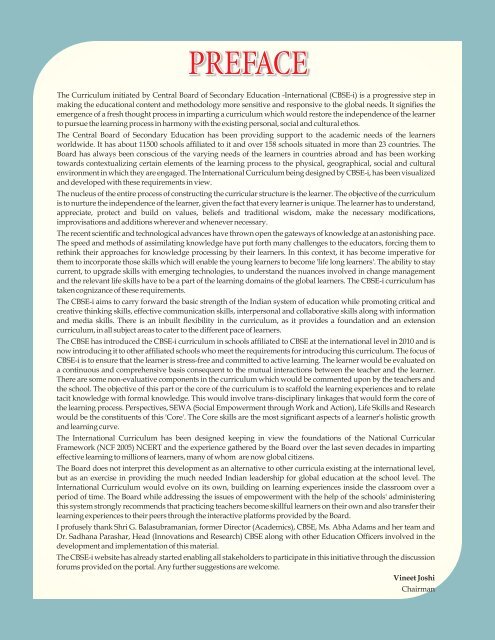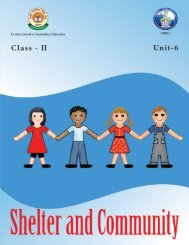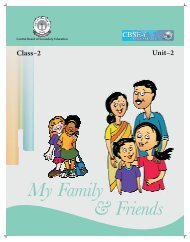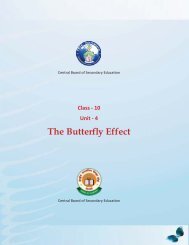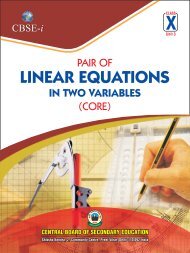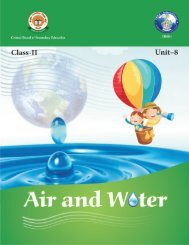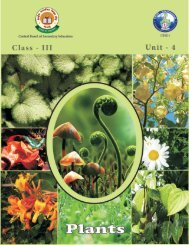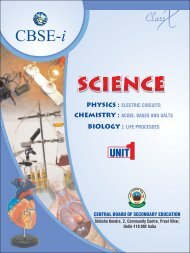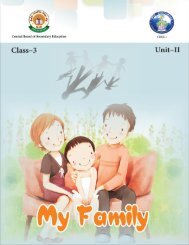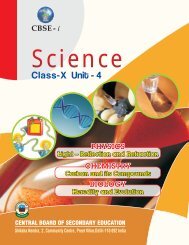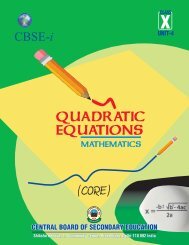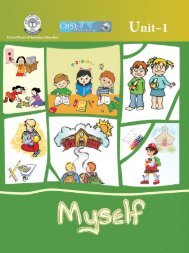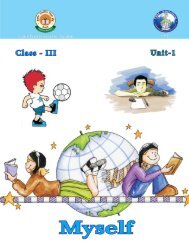CBSEi Class 10 Sequences (AP and GP) CORE
CBSEi Class 10 Sequences (AP and GP) CORE
CBSEi Class 10 Sequences (AP and GP) CORE
You also want an ePaper? Increase the reach of your titles
YUMPU automatically turns print PDFs into web optimized ePapers that Google loves.
PREFACE<br />
The Curriculum initiated by Central Board of Secondary Education -International (CBSE-i) is a progressive step in<br />
making the educational content <strong>and</strong> methodology more sensitive <strong>and</strong> responsive to the global needs. It signifies the<br />
emergence of a fresh thought process in imparting a curriculum which would restore the independence of the learner<br />
to pursue the learning process in harmony with the existing personal, social <strong>and</strong> cultural ethos.<br />
The Central Board of Secondary Education has been providing support to the academic needs of the learners<br />
worldwide. It has about 11500 schools affiliated to it <strong>and</strong> over 158 schools situated in more than 23 countries. The<br />
Board has always been conscious of the varying needs of the learners in countries abroad <strong>and</strong> has been working<br />
towards contextualizing certain elements of the learning process to the physical, geographical, social <strong>and</strong> cultural<br />
environment in which they are engaged. The International Curriculum being designed by CBSE-i, has been visualized<br />
<strong>and</strong> developed with these requirements in view.<br />
The nucleus of the entire process of constructing the curricular structure is the learner. The objective of the curriculum<br />
is to nurture the independence of the learner, given the fact that every learner is unique. The learner has to underst<strong>and</strong>,<br />
appreciate, protect <strong>and</strong> build on values, beliefs <strong>and</strong> traditional wisdom, make the necessary modifications,<br />
improvisations <strong>and</strong> additions wherever <strong>and</strong> whenever necessary.<br />
The recent scientific <strong>and</strong> technological advances have thrown open the gateways of knowledge at an astonishing pace.<br />
The speed <strong>and</strong> methods of assimilating knowledge have put forth many challenges to the educators, forcing them to<br />
rethink their approaches for knowledge processing by their learners. In this context, it has become imperative for<br />
them to incorporate those skills which will enable the young learners to become 'life long learners'. The ability to stay<br />
current, to upgrade skills with emerging technologies, to underst<strong>and</strong> the nuances involved in change management<br />
<strong>and</strong> the relevant life skills have to be a part of the learning domains of the global learners. The CBSE-i curriculum has<br />
taken cognizance of these requirements.<br />
The CBSE-i aims to carry forward the basic strength of the Indian system of education while promoting critical <strong>and</strong><br />
creative thinking skills, effective communication skills, interpersonal <strong>and</strong> collaborative skills along with information<br />
<strong>and</strong> media skills. There is an inbuilt flexibility in the curriculum, as it provides a foundation <strong>and</strong> an extension<br />
curriculum, in all subject areas to cater to the different pace of learners.<br />
The CBSE has introduced the CBSE-i curriculum in schools affiliated to CBSE at the international level in 20<strong>10</strong> <strong>and</strong> is<br />
now introducing it to other affiliated schools who meet the requirements for introducing this curriculum. The focus of<br />
CBSE-i is to ensure that the learner is stress-free <strong>and</strong> committed to active learning. The learner would be evaluated on<br />
a continuous <strong>and</strong> comprehensive basis consequent to the mutual interactions between the teacher <strong>and</strong> the learner.<br />
There are some non-evaluative components in the curriculum which would be commented upon by the teachers <strong>and</strong><br />
the school. The objective of this part or the core of the curriculum is to scaffold the learning experiences <strong>and</strong> to relate<br />
tacit knowledge with formal knowledge. This would involve trans-disciplinary linkages that would form the core of<br />
the learning process. Perspectives, SEWA (Social Empowerment through Work <strong>and</strong> Action), Life Skills <strong>and</strong> Research<br />
would be the constituents of this 'Core'. The Core skills are the most significant aspects of a learner's holistic growth<br />
<strong>and</strong> learning curve.<br />
The International Curriculum has been designed keeping in view the foundations of the National Curricular<br />
Framework (NCF 2005) NCERT <strong>and</strong> the experience gathered by the Board over the last seven decades in imparting<br />
effective learning to millions of learners, many of whom are now global citizens.<br />
The Board does not interpret this development as an alternative to other curricula existing at the international level,<br />
but as an exercise in providing the much needed Indian leadership for global education at the school level. The<br />
International Curriculum would evolve on its own, building on learning experiences inside the classroom over a<br />
period of time. The Board while addressing the issues of empowerment with the help of the schools' administering<br />
this system strongly recommends that practicing teachers become skillful learners on their own <strong>and</strong> also transfer their<br />
learning experiences to their peers through the interactive platforms provided by the Board.<br />
I profusely thank Shri G. Balasubramanian, former Director (Academics), CBSE, Ms. Abha Adams <strong>and</strong> her team <strong>and</strong><br />
Dr. Sadhana Parashar, Head (Innovations <strong>and</strong> Research) CBSE along with other Education Officers involved in the<br />
development <strong>and</strong> implementation of this material.<br />
The CBSE-i website has already started enabling all stakeholders to participate in this initiative through the discussion<br />
forums provided on the portal. Any further suggestions are welcome.<br />
Vineet Joshi<br />
Chairman


